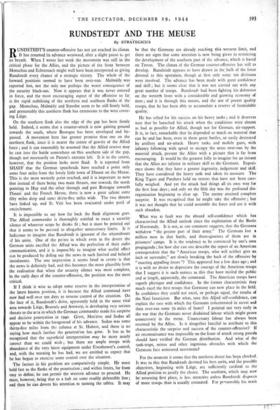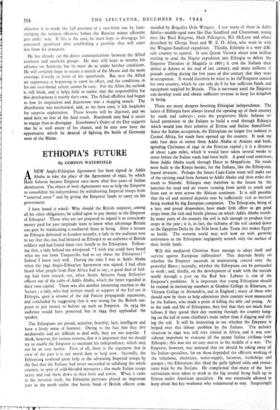RUNDSTEDT AND THE MEUSE
By STRATEG1CUS
RUNDSTEDT'S counter-offensive has not yet reached its climax. It has resumed its advance westward, after a slight pause to get its breath. When I wrote last week the movement was still in the
critical phase for the Allies, and the picture of the front between Monschau and Echternach might well have been interpreted as giving
Rundstedt every chance of a strategic victory. The whole of the forward positions seemed to have been over-run. Malmedy was reported lost, not the only nor perhaps the worst consequence of the security black-out. Now it appears that it was never entered in force, and the most encouraging aspect of the offensive so far. is the rapid stabilising of the northern and sotithern flanks of the gap. Monschau, Malmedy and Stavelot seem to be still firmly held, and presumably this northern flank has extensions to the west cover- ing Liege.
On the southern flank also the edge of the gap has been firmly held. Indeed, it seems that a counter-attack is now gaining ground
towards the south, where Bastogne has been enveloped and by-
passed. A movement here has greater promise than one on the northern, flank, since it is nearer the centre of gravity of the Allied force ; and it can reasonably be assumed that the Allied reserve may be cast into the battle somewhere on This southern side of the gap, though not necessarily on Patton's extreme left. It is in the centre, however, that the position looks most fluid. It is reported from SHAEF that the German spearheads have reached a point only some four miles from the lovely little town of Dinant on the Meuse. This is the most westerly point reached, and it is important to note that instead of there being two main thrusts, one towards the north pointing to Huy and the other through and past Bastogne towards Dinani and the French Meuse, there is now a great salient some fifty miles deep and some thirty-five miles wide. The two thrusts have linked up. and St. Vith has been evacuated under peril of encirclement.
It is impossible to say how far back the flank alignment goes. The Allied commander is thoroughly entitled to exact a security silence of whatever scope he thinks fit ; but it must be pointed out that it seems to be pressed to altogether unnecessary limits. It is ludicrous to imagine that Rundstedt is ignorant of the whereabouts of his units. One of the po'nts in which even in the desert the
German units excelled the Allied was the perfection of their radio communication, and it is imposs.ble to imagine what useful effect
can be produced by doling out the news in such limited and belated instalments. The one impression it seems fated to create -is that the news is definitely bad, and this becomes the more plausible from
the realisation that when the security silence was most complete, In. the early days of the counter-offensive, the position was the most critical:
If I think it wise to adopt some reserve in the interpretation of the latest known position, it is because the Allied command have now had well over ten days to resume control of the situation. On the face of it, Rundstedes drive, apparently held in the more vital area towards Liege, Brussels and Antwerp, is developing very serious threats to the area in which the German commander made his surprise and decisive penetration in 1940. Givet, Mezieres and Sedan all appear to be within the foreground of his advance. Sedan was some thirty-five miles from the column at St. Hubert, and there is no saying how much further the penetration has gone. It has to be recognised that the superficial interpretation may be more nearly correct than we could wish ; but there are ample troops with abundance of the very latest equipment under Eisenhower's control, and, with the warning he has had, we are entitled to expect that he has begun to exercise some control over the situation.
The factors in his problem are comparatively simple. He must hold fast to the flanks of the penetration ; and within limits, far from easy to define, he can permit the western advance to proceed. He must, however, bring that to a halt on some readily defensible line; and then he can devote his attention to turning the tables. It may be that the Germans are already reaching this western limit, and there are signs that some attention is now being given to restricting the development of the southern part of the advance, which is based on Treves. The climax of the German counter-offensive has still to develop. Rundsledt appears to have drawn in the, bulk of the force devoted to this operation, though at first only some ten divisions were involved. The advance has been made with great confidence and skill ; but it seems clear that it was not carried out with any great number of troops. Rundstedt had been fighting his defensive on the western front with a considerable and growing economy of men ; and it is through this means, and the use of poorer quality troops, that he has been able to accumulate a reserve of formidable quality.
He has relied for his success on his heavy tanks ; and it deserves note that he launched his attack when the conditions were almost as bad as possible for Allied, though not for German, air-support. It is, in fact, remarkable that he depended so much on material that can be and has been, even in these great battles, so easily destroyed by artillery and air-attack. Heavy tanks and mobile guns, with infantry following with speed to occupy the areas over-run by the material attack, present the Allies with a picture that is far from encouraging. It would be the greatest folly to imagine for an instant that the Allies are inferior in military skill to the Germans. Experi- ence shows that they have a greater ingenuity, judgement and skill. They have considered the heavy tank and taken its measure. The King Tigers and Panthers hold no terrors that have not been care- fully weighed. And yet the attack had things all its own way for the first four days ; and only on the fifth day was the profound dis- organisation beginning to clear up. The enemy attained complete surprise. It was recognised that he might take the offensive ; but it was not thought that he could assemble the force and use it with such abandon.
What was at fault was the absurd self-confidence which has characterised the Allied outlook since the exploitation of the Battle of Normandy. It is not, as one comment suggests, that the Germans withdrew "the greater part of their army." The Germans lost million men in that battle, and three-quarters of them are in prisoners' camps. It is the tendency to be convinced by one's own propaganda ; for how else can one describe the report of an American correspondent that the "American troops, who will neither give an inch or surrender," are slowly breaking the back of the offensive by "exacting appalling losses "? This appeared but a few days ago ; and it is with no desire to depreciate the courage of the American troops that I suggest it is such notices as this that have misled the public and at length, apparently, the command. The American troops have superb physique and confidence. In the former characteristic they much excel the best troops that Germany can now place in the field. In confidence they could not excel, or perhaps equal, the results of the Nazi fanaticism But what, save this Altied self-confidence, can explain the ease with which the Germans concentrated in secret and then over-ran some 70 miles of front? I pointed out very early in the war that the Germans never disdained labour which might prove unnecessary* in the event. Unnecessary labour has always been resented by the Allies. Is it altogether fanciful to attribute to this characteristic the surprise and success of the counter-offensive? If air reconnaissance was impossible on the front of attack strong patrols should have verified the German distribution. And what of the tank-traps, mines and other ingenious obstacles with which the Germans face armoured movement?
For the moment it seems that the northern thrust has been checked. It was to this that Rundatedt deviated his best units, and the possible objectives, beginning with Liege; are sufficiently cardinal to the Allied position to justify the choice. The southern, which may now be assuming first place, is less attractive unless Rundstedt disposes of more troops than is usually estimated. For pmumably his main
objective is to evade the full pressure of a two-front war by ham- stringing the western offensive before the Russian winter offensive gets unde: way. If this is the case, he must hope to disengage his armoured spearhead after establishing a position that will exact less from his resources.
He has already cut the direct communications between the Allied northern and southern groups. He may still hope to resume his advance on Antwerp, but he must do so under harsher conditions. He will certainly, hope to secure a stretch of the Meuse and the main crossings cfrectly in front of his spearheads. But now the Allied air supremacy is beginning to exert its effect, and the conditions in his not over-broad salient cannot be easy. For the Allies the outlook is still bleak, and it helps little to realise that the responsibility for this development is mainly their own. The Allied offerisive had begun to lose its inspiration and degenerate into a slogging match. The distribution was mechanical, and, as we have seen, it left loopholes for surprise exploitation. These lessoris will be digested, and we need have no fear of the final result. Rundstedt may find it easier to engage than to disengage. Eisenhower's Order of the Day suggests that he is well aware of his chance, and he may now have the opportunity which he desired of fighting the battle of Germany west of the Rhine.



























 Previous page
Previous page